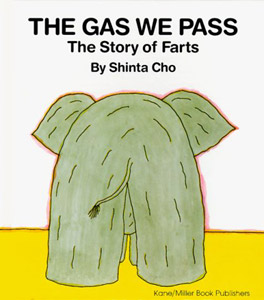The Gas We Pass
The Gas We Pass is an informative children's book that explores the natural process of flatulence in humans and animals. Written by Shinta Cho, a renowned Japanese author known for his work in children's literature, the book aims to demystify and destigmatize the concept of passing gas through engaging illustrations and simple, straightforward language.
Overview[edit | edit source]
The Gas We Pass provides a scientific yet accessible explanation of why and how living beings produce gas as a part of their digestive process. It covers the journey of food through the digestive system, explaining how gas is formed as a natural byproduct of digestion. The book emphasizes that all living creatures, including humans, pass gas as a normal bodily function, thereby encouraging a healthy and open conversation about the body.
Themes[edit | edit source]
The primary theme of The Gas We Pass is the natural and universal aspect of flatulence. By presenting the subject in a factual and non-judgmental manner, Shinta Cho addresses the often taboo topic of bodily functions, particularly flatulence, in a way that is both educational and comforting to children. The book also touches upon themes of biology, anatomy, and physiology, making it a valuable educational resource.
Reception[edit | edit source]
Since its publication, The Gas We Pass has been praised for its ability to tackle a sensitive subject with humor and respect. Educators, parents, and healthcare professionals have recognized the book as an excellent tool for teaching children about their bodies, helping to alleviate any embarrassment or confusion surrounding natural bodily functions. Its straightforward approach has made it a popular choice in schools, libraries, and homes around the world.
Impact[edit | edit source]
The impact of The Gas We Pass extends beyond its educational value. By breaking down the stigma associated with talking about bodily functions, the book has opened up avenues for more open and honest discussions between children and adults about the human body and health. It has also inspired other authors and educators to approach sensitive topics in a similar manner, contributing to a more informed and understanding society.
See Also[edit | edit source]
Search WikiMD
Ad.Tired of being Overweight? Try W8MD's physician weight loss program.
Semaglutide (Ozempic / Wegovy and Tirzepatide (Mounjaro / Zepbound) available.
Advertise on WikiMD
|
WikiMD's Wellness Encyclopedia |
| Let Food Be Thy Medicine Medicine Thy Food - Hippocrates |
Translate this page: - East Asian
中文,
日本,
한국어,
South Asian
हिन्दी,
தமிழ்,
తెలుగు,
Urdu,
ಕನ್ನಡ,
Southeast Asian
Indonesian,
Vietnamese,
Thai,
မြန်မာဘာသာ,
বাংলা
European
español,
Deutsch,
français,
Greek,
português do Brasil,
polski,
română,
русский,
Nederlands,
norsk,
svenska,
suomi,
Italian
Middle Eastern & African
عربى,
Turkish,
Persian,
Hebrew,
Afrikaans,
isiZulu,
Kiswahili,
Other
Bulgarian,
Hungarian,
Czech,
Swedish,
മലയാളം,
मराठी,
ਪੰਜਾਬੀ,
ગુજરાતી,
Portuguese,
Ukrainian
Medical Disclaimer: WikiMD is not a substitute for professional medical advice. The information on WikiMD is provided as an information resource only, may be incorrect, outdated or misleading, and is not to be used or relied on for any diagnostic or treatment purposes. Please consult your health care provider before making any healthcare decisions or for guidance about a specific medical condition. WikiMD expressly disclaims responsibility, and shall have no liability, for any damages, loss, injury, or liability whatsoever suffered as a result of your reliance on the information contained in this site. By visiting this site you agree to the foregoing terms and conditions, which may from time to time be changed or supplemented by WikiMD. If you do not agree to the foregoing terms and conditions, you should not enter or use this site. See full disclaimer.
Credits:Most images are courtesy of Wikimedia commons, and templates Wikipedia, licensed under CC BY SA or similar.
Contributors: Prab R. Tumpati, MD

